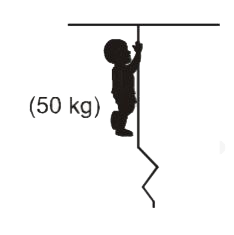A monkey is decending from the branch of a tree with constant acceleration. If the breaking strength is 75% of the weight of the monkey, the minimum acceleration with which monkey can slide down without breaking the branch is
g
3g4
g4
g2
To solve the problem, we need to analyze the forces acting on the monkey as it descends from the branch of the tree with a constant acceleration.
1. Identify the Forces Acting on the Monkey:
- The weight of the monkey (W) acting downwards is given by W=mg, where m is the mass of the monkey and g is the acceleration due to gravity.
- The tension (T) in the branch acting upwards.
2. Breaking Strength of the Branch:
- The breaking strength of the branch is given as 75% of the weight of the monkey. Thus, we can express this as:
Tmax=0.75mg
3. Apply Newton's Second Law:
- When the monkey is descending with an acceleration a, we can apply Newton's second law. The net force acting on the monkey can be expressed as:
Fnet=W−T=ma
- Substituting the weight of the monkey:
mg−T=ma
4. Rearranging the Equation:
- We can rearrange the equation to express the tension in terms of the other variables:
T=mg−ma
5. Setting the Tension Equal to the Maximum Tension:
- To find the minimum acceleration a at which the branch does not break, we set the tension equal to the maximum tension:
mg−ma=0.75mg
6. Solving for Acceleration:
- Rearranging the equation gives:
mg−0.75mg=ma
0.25mg=ma
- Dividing both sides by m (assuming m≠0):
0.25g=a
7. Final Result:
- Therefore, the minimum acceleration with which the monkey can slide down without breaking the branch is:
a=0.25g
- The weight of the monkey (W) acting downwards is given by W=mg, where m is the mass of the monkey and g is the acceleration due to gravity.
- The tension (T) in the branch acting upwards.
- The breaking strength of the branch is given as 75% of the weight of the monkey. Thus, we can express this as:
Tmax=0.75mg
- When the monkey is descending with an acceleration a, we can apply Newton's second law. The net force acting on the monkey can be expressed as:
Fnet=W−T=ma
- Substituting the weight of the monkey:
mg−T=ma
- We can rearrange the equation to express the tension in terms of the other variables:
T=mg−ma
- To find the minimum acceleration a at which the branch does not break, we set the tension equal to the maximum tension:
mg−ma=0.75mg
- Rearranging the equation gives:
mg−0.75mg=ma
0.25mg=ma
- Dividing both sides by m (assuming m≠0):
0.25g=a
- Therefore, the minimum acceleration with which the monkey can slide down without breaking the branch is:
a=0.25g
Topper's Solved these Questions
Similar Questions
Knowledge Check
A mokey is descending from the branch of a tee with constant acceleration. If the the monkey, the minimum acceleration with which monkey can slide down without breaking the branch is
AgB3g4Cg4Dg2A stone is accelerated upwards by a cord whose breaking strength is three times the weight of the stone. The maximum acceleration with which the stone can be moved up without breaking the cord is
AgB2 gC3 gD4gA person wishes to slide down a rope whose breaking load is 35 of the weight of the person Minimum acceleration by which the person should slide down without breaking the rope is:
A0.8gB1.2gC0.6gD0.4g
A fireman is sliding down with the help of a rope. If the breaking strength of the rope is 2mg3 where m is the mass of the man, the minimum acceleration with which the fireman can slide, so that the rope does not break, is :
View SolutionA fireman want to slide down a rope. The breaking load the rope is 3/4th of the weight of the man. With what minimum acceleration should the fireman slide down ?
View SolutionThe minimum acceleration with which a fireman can slide down a rope of breaking strength two - third of his weight is
View SolutionA sphere is accelerated upwards with the help of a cord whose braking strength is five times its weight. The maximum acceleration with which the sphere can move up without cord breaking is :-
View SolutionThe animal which hangs upside down from tree branches is
View Solution


